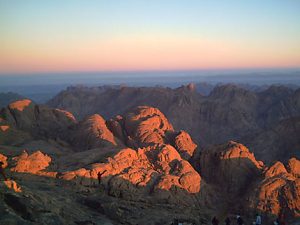 The masters of the Talmud make us glimpse a universalism inherent in Jewish culture in one of their comments on the precise meaning of the words of the Decalogue.
The masters of the Talmud make us glimpse a universalism inherent in Jewish culture in one of their comments on the precise meaning of the words of the Decalogue.
They say that the first word Anokhi is an Egyptian word. In their commentary they explain that the Israelites fresh out of Egypt were to be addressed in the language they understood, the Egyptian language.
Hence the word Anokhi, the first word of the 10 commandments which means I Am.
This mit is indeed associated with the Egyptian Ankh.
The ancient Egyptian language is closely related to the Amazigh language, which is actually the same language at a different stage in its history.
The Arameene language was the administrative language of Akhenaton.
So the two Semitic and Afro Asian families have been historically linked since antiquity.
The place where the patriarchs are buried, Hebron, is called in the Torah “Abel Misraim”, the mourning of Egypt, because Pharaoh and all Egypt came to cry there Jacob.
Because the third Patriarch like his son Joseph later, were mummified in great honor, like the monarchs of this purely African civilization.
Israel is thus rocked in the Egyptian culture since the Patriarch of which the nation inherited the name.
Moses’ journey begins at his birth when he was saved and then raised by Bithyah the daughter of Pharaoh.
Later King Solomon also married another Bathyah daughter of Pharaoh.
So many elements are present to justify that our Sages see in the first word of the Decalogue an Egyptian presence because the proximity is already established in the narration as well as the language.
We could likewise apply this reasoning to the last word of the Decalogue.
This word is לרעך “see you next.”
In another famous verse this word is used.
It is
ואהבת לריעך כמוך
You will love your neighbor as yourself.
The Sages interpret this word ריעך “your neighbor” by saying
ריעך וריע אביך
“Your neighbor and your father’s neighbor”, that is to say Hakadosh Baroukh Hou, The Creator Blessed Be He.
This interpretation of the Sages could also be due to the Egyptian reading of the word ריעך, “your neighbor”.
Because the Egyptian word for Creator is ריע, the same word as next.
The lesson we can learn from this linguistic exploration is the implication that love of neighbor and love of God could be in fact one and the same thing.
